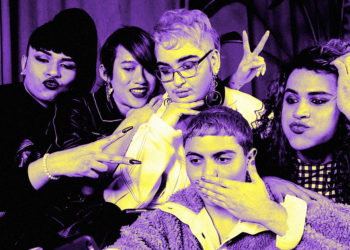EYE OF THE MONKEY, by Krisztina Toth; translated by Ottilie Mulzet
It sounds at first like a standard-issue dystopian novel preoccupied with world-building: An unnamed country — well, unnamed, but it’s small, isolated, in the middle of Europe, and the characters have Hungarian names — has closed its borders after a civil war, rebirthing itself as the Unified Regency. Under the autocratic Regent, the capital city has been divided into “protected” and “segregated” zones, with stratified services, products, laws and resources.
Those in the protected areas are better off but live under constant surveillance. Students who enroll at the city’s New University pay no tuition but must pledge to work later for a state institution, and must spend 30 hours a month in a government troll factory writing hateful comments online.
But this dystopian state isn’t the focus of Krisztina Toth’s novel “Eye of the Monkey,” first published in Hungarian in 2022. And we don’t learn many details of what, exactly, has happened; opaque references to strange events involving pyramids in Bosnia and Mexico, and to new laws like the banning of DNA tests, suffice. Rather, this strangled political landscape is simply a backdrop, a host for powerful electric currents — those personal, existential dramas of longing, misunderstanding, loss, passion, betrayal and desperation.
We begin with a first-person narrative: Giselle, a university professor, is trailed by a young man who claims to be her son even though she has never had children. From her harried and depressed viewpoint, the novel branches rhizomatically into multiple third-person narratives involving Giselle’s psychologist, Mihaly, with whom she starts an ill-fated affair; Mihaly’s estranged wife; his late mother; Giselle’s professed son; his girlfriend; and even the Regent himself, one of Mihaly’s longtime patients who finds himself dealing in the darkest possible ways with imminent environmental disaster.
Often, one narration takes over in the middle of another. We’re in the midst of Mihaly’s wife’s thoughts when we plunge into his own memories of childhood. Strangers appear in the periphery: An unnamed man sees lightning strike his friend in a storm, “stringing this curled up human pearl onto its incandescent thread.” We move forward, backward and sideways in time, and it isn’t always clear what direction the river flows.
Novels that take on this assignment (Many characters! Many walks of life! A tortuous chronology!) tend to end up dissipated and confusing. Remarkably, Toth manages to hold our focus as the story forks in controlled, if mysterious, ways. A book that can be snaking and labyrinthine without sprawling aimlessly is — like an author who can handle elusiveness without opacity or coyness — quite a rare thing.
Toth’s choice of form, an ominous narrative web that connects many characters stuck in a country with closed borders, is far from arbitrary. These people become victims, some when they least expect it, of a system they’re complicit in; they seem autonomous but are ultimately contained by the instruments of power. It takes a closed circuit, after all, for electricity — that illuminating but critically dangerous force — to flow.
There’s a circularity even to the words themselves, as certain phrases, set in bold type in the middle of the text, return later as chapter titles in lowercase letters, sometimes more than once. Other times, it’s the cryptic chapter titles (“one thousand deer were burned”) that appear later as bolded text (in the case of the deer, as something Giselle reads in a magazine at the dentist).
If I’ve made “Eye of the Monkey” seem like a dark book, that’s not without reason. Every single character is careening toward doom. But it’s also deeply funny, especially when Toth’s gift for metaphor claims its space. Giselle, after a sexual encounter with Mihaly, gets dressed “as if she were leaving a gynecological appointment.” Mihaly compares her sagging breasts to mozzarella. A sleeper chair, abandoned mid-construction with its coiled springs dangling on either side, looks like “a sad and offended rabbi who, having lost his prestige, was asked for counsel by no one.”
Toth was born in Budapest in 1967, studied French literature in Paris and has worked as a stained-glass artist. She has recently chosen to live outside Hungary, citing persecution in the government-controlled press. Her work includes numerous poetry collections, story collections, children’s books and plays, as well as two novels. “Eye of the Monkey,” her second, is the first to be translated into English. It’s our fortune that Ottilie Mulzet, a prolific translator of Hungarian, was up to the task of capturing both the strangeness and the poetry of the text.
At a moment when writers in America ask what stories we might tell from and about a rapidly constricting regime, we would do well to read the authors who’ve dealt with one for far longer. In its rendering of such a landscape, this book is Orwellian and destabilizing. And in its surreality, it’s all too real.
EYE OF THE MONKEY | By Krisztina Toth | Translated by Ottilie Mulzet | Seven Stories Press | 301 pp. | Paperback, $21.95
The post A Novel Intertwines the Many Dramas of Life in an Autocracy appeared first on New York Times.




